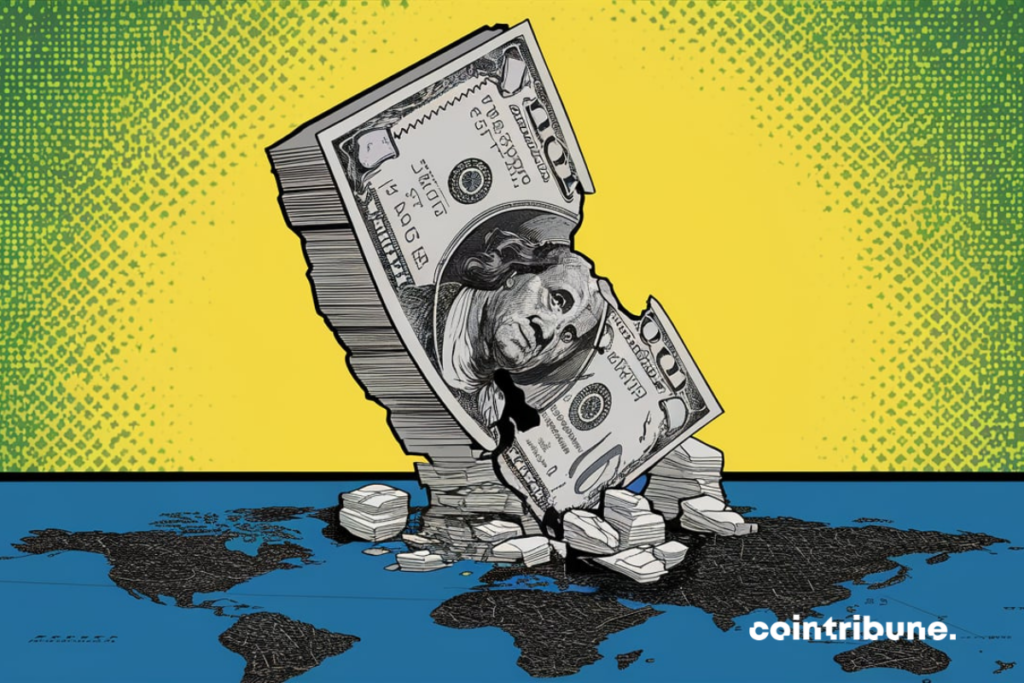The US dollar’s share of foreign reserves remains dominant, though it has continued to slowly erode. This has been accompanied by a rise for others such as the Australian dollar, Canadian dollar, Chinese renminbi, and Korean won. https://t.co/c5juEUgHJP pic.twitter.com/Y7f6kThl5q
— IMF (@IMFNews) June 11, 2024
Bitcoin – The Dollar Falters
9d ago•
bullish:
0
bearish:
0
Share
The IMF has published its quarterly update on foreign exchange reserves held by central banks. The dollar is in free fall. Bitcoin as an alternative?

The Dollar Falls into Obsolescence
The IMF notes in its paper that the US dollar continues to lose ground in global foreign exchange reserves, but it remains the primary reserve currency.
The institution inherited from the Bretton Woods agreements warns that economic and financial fragmentations could encourage some countries to diversify their foreign exchange reserves.
The IMF speaks of a “gradual” decline of the dollar, which is an understatement. The dollar’s share has fallen from 70% to 58% in just two decades. Knowing that the real figure is more like 55% if we adjust it for the recent appreciation of the dollar:
We even drop to 48% if we take gold reserves into account!
The IMF notes on this subject:
“We observe that financial sanctions are causing central banks to slightly modify their reserve portfolios by moving away from currencies that risk being frozen, in favor of gold.”
India, for example, recently repatriated 100 tons of gold from London. Gold seems to be an integral part of the new international monetary system that the BRICS wish to establish.
According to the Iranian Minister of Foreign Affairs, “the economy ministers of the BRICS countries are on the verge of completing the de-dollarization program”. What will be the pivot currency to replace it? Radio silence for now.
Contenders for the Throne?
The IMF notes that it “is striking to observe that the reduction in the role of the US dollar over the past two decades has not been accompanied by an increase in the share of other major currencies, such as the euro, yen, and pound”.
Rather, non-traditional reserve currencies like the Australian dollar, Canadian dollar, Chinese yuan, South Korean won, Singapore dollar, and Nordic currencies are coming to the fore.
The Chinese yuan is another non-traditional reserve currency, but its internationalization “shows signs of fatigue”, according to the paper. The yuan’s share in foreign exchange reserves has even declined since 2022.
That said, the growth of the Chinese currency as an international payment means is strong. The CIPS (Cross-Border Interbank Payment System) facilitated transactions amounting to 123 trillion yuan ($17 trillion) in 2023.
Finally, and contrary to what one might read here and there, the dollar is not just suffering from the mistrust of a handful of countries. Russia, of course, has good reasons to get rid of the dollar, but it’s a deeper trend:
“We identified at least 46 countries in 2022 that are diversifying their reserves (countries with at least 5% of their foreign exchange reserves in non-traditional currencies at the end of 2020). These include major advanced economies and emerging markets, including most G20 economies.”
The Sino-Russian Axis and Bitcoin
The Russian central bank declared this week that the Chinese yuan will become Russia’s main foreign currency. The yuan/ruble exchange rate will now determine the trajectory of all other currency pairs, including the euro and the dollar.
“The yuan has already become the main currency in foreign exchange operations,” the Bank of Russia stated. “The yuan/ruble exchange rate will now be the reference rate for market players.”
“The yuan’s share in Moscow Exchange transactions in May was 54%,” it added. This figure is expected to increase since the euro and the dollar have just been completely banned following a new wave of Western sanctions.
All of this aligns with the accession of Saudi Arabia, the United Arab Emirates, and Iran to the BRICS. The end of the petrodollar is approaching rapidly, hence the attempts to foster chaos with Taiwan in sight. According to the FT, Xi Jinping warned Ursula Von Der Leyen in April 2023 that the United States “is trying to trap China into invading Taiwan, but he won’t take the bait”…
The fact that all central banks hold dollars (Treasury bonds, in reality) is an exorbitant privilege that Washington does not want to give up. Here are its main advantages:
-Chronically deficit trade balance without devaluation of the dollar.
-Low borrowing rates.
-Ability to blackmail nations with the threat of sanctions (disconnection from the SWIFT network).
“Rather war than letting China take away our monetary hegemony,” is likely the thought in the United States…
The solution would be for all nations to be on an equal footing by using a neutral currency: Bitcoin. On this note, the world’s largest bank (Industrial and Commercial Bank of China) has just stated that bitcoin “boasts a rarity similar to gold, via mathematical consensus, while solving divisibility, authenticity, and portability issues.”
We are heading towards the new Bretton Woods: Bitcoin.
9d ago•
bullish:
0
bearish:
0
Share


 (@EmbassyofRussia)
(@EmbassyofRussia) 






